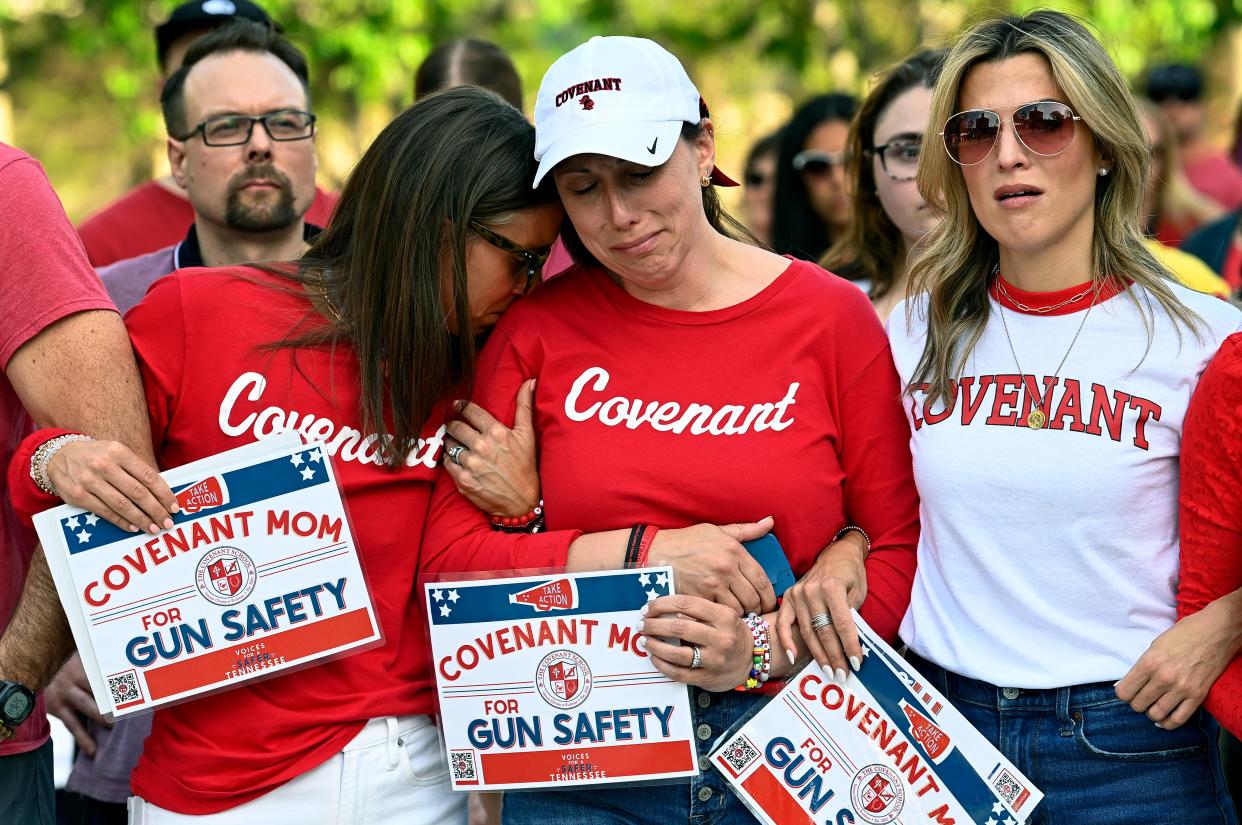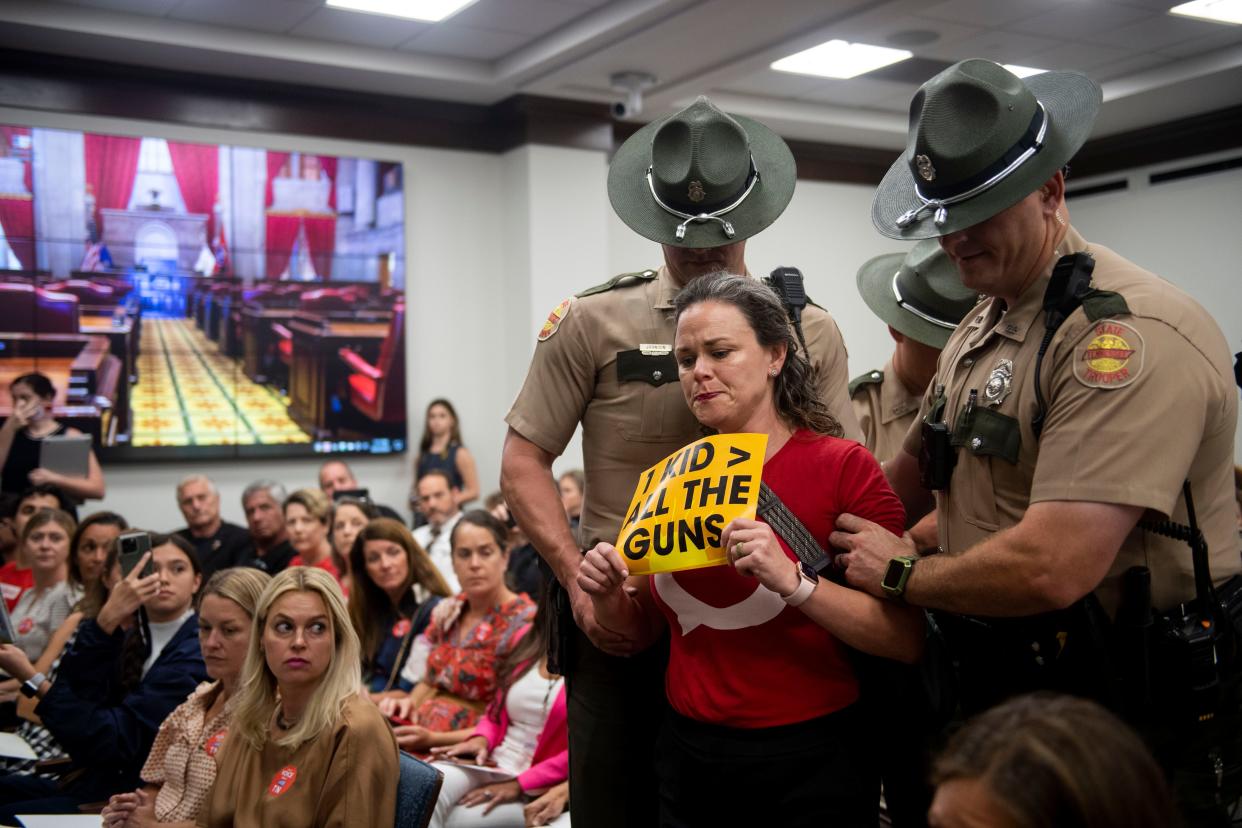After months of anguish, the fight over guns heads into a new legislative session
The Covenant School shooting claimed the lives of six, including three children.
In the aftermath, families begged en masse for lawmakers to do something. They pleaded through tears. They formed a three-mile human chain to the state Capitol to demand action. They organized into new advocacy groups – Republicans and Democrats alike.
The deadliest school shooting in state history put a spotlight on Tennessee’s gun laws and would forever shift the conversation in the state around firearm safety.
From high school students to grieving Covenant parents, thousands of demonstrators descended on the state Capitol demanding stronger gun laws. But after a tumultuous year of protests, the expulsions of two House members, and a chaotic special legislative session that ended in stalemate, Tennessee has seen little action.
Still, for those seeking change, the fight isn’t over. “You will see these faces again,” one Covenant mom vowed in August.
Indeed, as lawmakers return for their next regular session on Jan. 9., gun-control advocates say they aren’t letting up. They’re ramping up meetings with lawmakers, helping prepare legislation and speaking out in communities across the Volunteer State. And another tragedy just this month — the death of Belmont University student fatally shot by a stray bullet — is only adding to the sense of urgency.
“A lot of people feel like this is the right time for meaningful discussions and changes in the law,” said Erin Rogue, a policy director for Voices for a Safer Tennessee, an advocacy group formed in the wake of the Covenant shooting that now has more than 20,000 members.
How the gun conversation unfolded this year
In March, Republican lawmakers were busy pushing a round of bills to expand gun rights.
Then on a Monday morning, that all changed.
A mass shooter entered the Covenant School, a private Christian school in Green Hills, and killed three staff members and three 9-year-old children.
As demonstrators took to the streets, the chaos spilled into the state House of Representatives. Three Democrats broke House decorum rules to lead the gallery in chants for gun control.
The move lead to an extraordinary and historic action by the GOP supermajority in the House — a vote to expel two of the lawmakers. The third survived by one vote.
The expulsion and the Tennessee Three, as they become known, kept the state and gun reform in the national spotlight. Reps. Justin Jones, D-Nashville, and Justin Pearson, D-Memphis, returned to their seats quickly through reappointments and won reelection just months later.
Meanwhile, Gov. Bill Lee, known for his broad expansion of gun rights in 2021, was facing pressure. He, too, had felt the pain of the Covenant shooting. He and first lady Maria Lee were close friends with one of the staff members fatally shot that day.
In a controversial decision that drew ire from gun rights groups and his fellow Republicans, Lee began pushing an emergency protective order proposal aimed at keeping firearms out of the hands of those the courts deem a danger to themselves or others.
But it didn't gain support. He faced fierce backlash from gun-rights groups. Still, Lee pushed ahead and called lawmakers back for the special legislative session.
Gun control advocates and Covenant parents had hoped to see change from the special session, but they were quickly disappointed.
The session devolved into an impasse between the House and Senate with a slew of public safety bills tabled and no major action on gun control.

In all, the mass shooting has largely only slowed bills that would have expanded gun rights.
And this month, as Nashville was still reeling from a tough year, another tragedy hit when Belmont University freshman Jillian Ludwig died after she was struck in the head by a stray bullet.
The case sparked renewed calls for gun and mental health reform when it came to light that the suspect had been released from custody this year after being found incompetent to stand trial in another crime.
Now, with two high profile gun tragedies driving calls for change, lawmakers will face significant pressure when they return to the Capitol in January.
For his part, Lee said he is still working to finalize his legislative agenda and hopes to see good public safety initiatives.
"Every city and state in America is facing rising crime and challenges related to public safety, and there is no one, perfect solution," Lee said in a statement to The Tennessean. "This is a complex and evolving issue that is changing daily. We should never stop talking about ways to improve public safety and we will keep looking at opportunities to do that."
Here is a closer look at three major gun safety initiatives lawmakers will likely consider when they return in January.
Extreme risk protection order likely subject of legislative debate
Often known as “red flag laws,” extreme risk protection orders allow courts and law enforcement to remove guns from people deemed a risk to themselves or others. Twenty states now have such laws.
The governor this year pushed for his own version of the law but was met with pushback from Republican lawmakers who have said any red flag-type law would be a “non-starter.” They refused to take up the issue in August, although Lee has avoided the red-flag term and insists his proposal differs from other states.
But the shooting death of Ludwig and the suspect's history of mental impairment have prompted a renewed call for a law that would prevent dangerous people from having guns.
But some leading Republican lawmakers, like House Majority Leader William Lamberth, R-Portland, support strengthening involuntary commitment laws over gun control or any red-flag law.
“Red flag laws are ineffective at preventing violence, but keeping dangerous criminals off the streets protects innocent people 100 percent of the time,” he said in a statement.
Lt. Gov. Randy McNally, however, said he would support an extreme risk protection law, noting that Ludwig’s case makes it clear that more work needs to be done on public safety.
“While I have consistently supported the mental health order of protection proposed by the governor, that idea has not been embraced by other members of my caucus, though I remain hopeful it will be one day,” said McNally, R-Oak Ridge. “This coming session I think you will see a continued focus on mental health and not any measure that would restrict the ability of law-abiding citizens to possess a firearm.”
Democrats say they’re determined to once again address the issue of red-flag laws in January.
Sen. Jeff Yarbro, D-Nashville, said expanding laws to civilly commit more mentally impaired people won’t solve the problem.
“We can’t simply commit everyone who lacks that mental capacity,” he said. “This should absolutely open the conversation back up to red-flag laws. If you don’t have some sort of process to have courts examine a person and remove their guns before they’ve committed a violent act, by definition you’re waiting until they do something violent.”
Closing a mental health loophole
The Ludwig case also exposed what lawmakers say are dangerous loopholes in state law.
Before Ludwig’s death, the suspect, Shaquille Taylor, had been released from police custody in May after three court-appointed doctors testified that he was incompetent to stand trial for an assault with a deadly weapon charge.
But Taylor wasn’t committed to a mental health facility because he didn't meet state standards for involuntary commitment, according to court records.

Under current state law he still would have been legally allowed to buy a gun even though he was found mentally incompetent in a criminal case.
Yarbro said he is now working on a bill that will close that loophole and prevent people who have been found to be mentally incompetent from legally buying a gun. He’s hoping to have bipartisan support.
“After the Belmont incident there can’t be any argument that Tennessee laws are A-OK,” he said. “We need adjustments now and we need people to work together in good faith.”
For now, it’s unclear how many Republicans would support such a bill.
In another issue to address the laws, Lamberth is now working with Nashville District Attorney Glenn Funk on legislation that would see the state pay for mental health evaluations and treatment rather than the counties for those deemed incompetent to stand trial.
Safe storage as gun-theft crisis escalates
Tennessee has an epidemic of stolen guns from cars, and lawmakers in the past have unsuccessfully pushed for penalties for people who fail to safely store firearms.
Their latest efforts stalled in the August special legislative session when Lee barred any laws that would have penalties for gun owners. Instead, lawmakers approved a measure exempting firearm safes and other safety devices from the state sales tax. The law took effect Nov. 1.
But Caleb Hemmer, D-Nashville, hopes to get more support in January for a bill that would have some type of significant deterrent.
He points to the sheer number of stolen guns and few arrests.
Of 5,386 reported cases of guns stolen from cars statewide last year, less than 4% resulted in an arrest, according Tennessee Bureau of Investigation statistics.
And of those arrests, even fewer are prosecuted.
A Tennessean report this year found that the vast majority of gun theft charges in Davidson County were eventually dropped or dismissed, mostly due to lack of evidence.
In one of just three public safety bills passed in the August special session, a new law gave $1.1 million to the Tennessee Department of Safety and Homeland Security to distribute free gun locks to residents and launch an ad campaign on safe gun storage.
DSHS spokesman Wesley Moster said the agency has so far distributed 14,000 gun locks to partners and is developing the ad campaign.
Hemmer said the people of Tennessee need more action from lawmakers and penalties for careless gun owners. His efforts have been backed by law enforcement leaders, including Metro Nashville Police Chief John Drake.
“A marketing campaign will only go so far. Gun locks will only go so far,” he said. “Tennessee has a horrible problem with this, and we’re trying to fix it.”
Reach Kelly Puente at kpuente@tennessean.com
This article originally appeared on Nashville Tennessean: Tennessee gun debate: What to expect in the new legislative session
